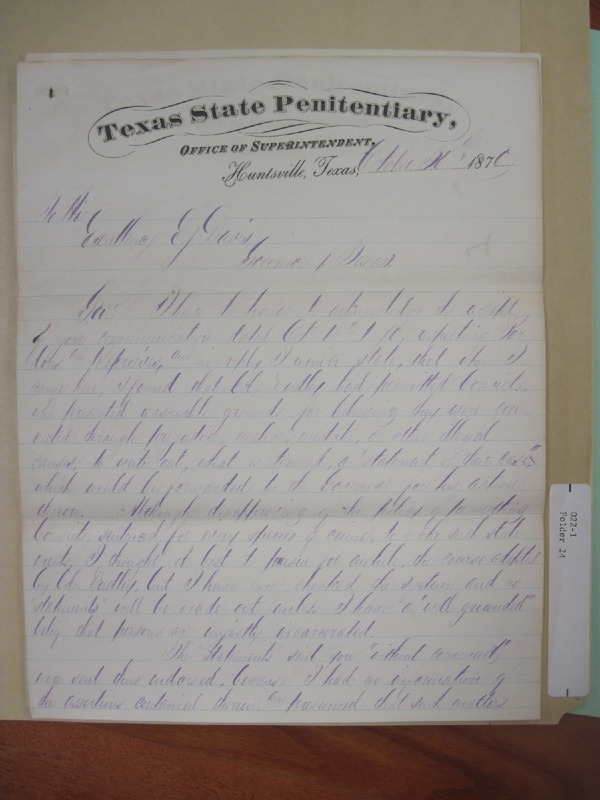
wcaleb Archive - index - about
Letter from Penitentiary Superintendent to Texas Governor
A. J. Bennett, the superintendent of the Huntsville penitentiary, writes to Governor E. J. Davis about the injustices suffered by people of color in the state and in the prison system.
A. J. Bennett
Records Relating to the Penitentiary, Texas State Library and Archives Commission, Box 022-1, Folder 24
Published here by W. Caleb McDaniel
October 30, 1870
This item is believed to be in the public domain. No copyright in the item is asserted or implied by its publication here.
English
Text
E90E40A0-E442-401D-8A17-5DA22370D7D6
To His Excellency E. J. Davis
Governor of Texas
Govr, I have the honor to acknowledge the receipt of your communication dated Octr 18th, 1870, respecting Pardons and Reprieves, and in reply I would state, that when I came here, I found that Col. Dudley had permitted Convicts, who presented reasonable grounds for believing they were convicted through prejudice, malice, mistake, or other illegal causes, to write out, what is termed, a “statement of their case,” which would be forwarded to the Governor for his action thereon. Although disapproving of the policy of permitting convicts, sentenced for every species of crime, to make such statements, I thought it best to pursue for awhile, the course adopted by Col. Dudley, but I have now checked the system and no “statements” will be made out unless I have a “well grounded” belief, that persons are unjustly incarcerated.
The “statements” sent you “without comment” were sent thus endorsed, because I had no information of the assertations contained therein, and presumed that such matters were referred to the Judges before whom the parties were tried, for the truth or untruth of such statements. All the applications sent you were from parties, in my opinion, deserving of Executive Clemency for their exemplary conduct, and who, through the machination of others; through prejudice and through drink have been made criminals, when actually there was no intention of crime exhibited in their conduct. Take for instance the case of James Wilson, a young man of good family and education, now here for a term of seven years for stealing a horse. The circumstances of the case are these: Wilson was a “newcomer” in Texas, went to Nacogdoches to live; got on a spree and while intoxicated straddled another man’s horse and rode a few miles out of town; remained at the place out of town, the night and next day drunk, was about returning to town when he was arrested, and having no friends, was tried and convicted, as above. Col. Dudley recommended this young man for pardon and I heartily join in that recommendation.
The victims of prejudice, I believe to be many within the walls, the Cooper Bros. (known refugees), Emily Brown, Charles Scott, Charles Bertram, Ellis Rogers (blind), Sam Tallis, and some others, strongly recommended to the consideration of your Excellency, are, in my opinion, either victims of the old slave oligarchists or are here, through the inveteracy of their personal enemies. I have said nothing as yet, with regard to the crying injustice which every court in Texas from 1865 to 1869 have perpetrated upon the colored man, but as the facts come to my knowledge, I make a note of it, and I believe, in a short time, some who “now walk in high places,” will acknowledge they pandered too much to the antipathies of communities. In my opinion, white men could not be convicted, in any county of Texas, for the crimes that a great majority of the colored men now here, are undergoing sentence. I have no power of commutation or reprieve, but had the good men in this place of punishment justice, they would not be here now.
I beg to refer you to the telegram from the President respecting “civilian prisoners convicted under Reconstruction Laws” and wish to know if said telegram releases the other “civilian prisoners” now in this Penitentiary undergoing sentence of Court Martial. I looked upon the telegram as specific in its character, and only released Messrs Alford and Grow. They have gone home, but whether the President indends that order to apply to all military prisoners I am unable to determine and would like your construction thereon. I enclose you a list of all the military “civilian prisoners” now here, and ask your instruction thereon.
With regard to the man “Rose,” a complete imbecile, mentioned in your letter of the 19th inst., just received, I have written to Jefferson respecting him, but have no reply as yet. I will endeavour to find his friends, but I think he will be a charge upon the State until he dies. I could turn him out in the street, but he would stand there unconscious of everything around him, until exhaustion would compel him to fall down. He is the most complete wreck of humanity that ever I saw, and it would be excessive cruelty on the part of the State, or me, to see him die in the [wall?]. I would be glad, however, to get rid of him, and have thought that his proper place was at the Insane Asylum.
Prisoners are now arriving almost daily. There is no money to pay Sheriffs fees or anything else, but I am of the opinion, that the reforms inaugurated and the constant employment of labor on hand, will eventually clear the Institution of debt and redound to the success of the Administration.
Very respectfully,
Your Obdt Sevt
A. J. Bennett
Supt